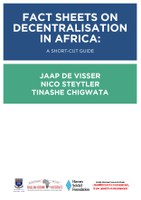Fact Sheets on Decentralisation in Africa
-
FACT SHEETS ON DECENTRALISATION IN AFRICA: A SHORT-CUT GUIDE
A growing number of African countries are considering passing or implementing reforms that include some form of decentralisation. There is thus a demand for clear and accessible materials that would assist policymakers, practitioners, students and members of the public to better understand the various concepts and mechanisms associated with decentralisation. A few countries on the continent are considering or implementing federalism, while many more are weighing up or are already implementing decentralised systems of government.
Download in English | French | Portuguese | Arabic
-
FACTSHEET#1 Decentralisation: Key Concepts
Decentralisation is a concept that has gained significant attention in recent years. The concept can be challenging due to its abstract nature and the many forms it can take. To help shed light on the key concepts associated with decentralisation, FACTSHEET#1 provides clear definitions of the key concepts associated with decentralisation within the African context.
Download in English | French | Portuguese | Arabic
-
FACTSHEET#2 Federalism and Federations
This FACTSHEET#2 explores how federalism has been applied in several countries in Africa. It provides an overview of the objectives of federal political systems, and common structural design features and explains key concepts associated with federal systems such as self-rule and shared rule.
Download in English | French | Portuguese | Arabic
-
FACTSHEET#3 Local Government: Factors and reasons in favour of decentralisation
There are a number of aspects and reasons why African nations favour decentralisation. This FACTSHEET#3 examines the common rationales and justifications for decentralisation, as well as arguments against it.
Download in English | French | Portuguese | Arabic
-
Factsheet#4 Local Government Autonomy
Local autonomy is an indispensable aspect of democratic government. It refers to the degree to which local governments have discretion in carrying out their responsibilities. This does not imply ultimate freedom, and autonomy varies from nation to nation. This FACTSHEET#4 examines the fundamental characteristics of local autonomy.
Download in English | French | Portuguese | Arabic
-
Factsheet#5 Local Government Powers
The powers of local government are an important indicator of the degree of local autonomy. This FACTSHEET#5 explores how local governments are empowered and how their powers are protected and ensured.
Download in English | French | Portuguese | Arabic
-
Factsheet#6 Local Government Finances
Finances lie at the core of effective and autonomous local government. If denied sufficient funding, local authorities cannot perform their functions. The FACTSHEET#6 explores local government finances, which typically revolve around four main matters: (1) the revenue of local authorities; (2) the budget; (3) expenditure; and (4) internal and external controls to prevent and correct poor financial management, including corruption.
Download in English | French | Portuguese | Arabic
-
Factsheet#7 Supervision of Local Government
Local governments require some form of autonomy if they are to be effective in delivering on their functions. Equally important is the need for higher levels of government to supervise local governments to ensure the promotion and protection of both local and national goals. Supervision is also important to deal with the ills often associated with decentralisation such as incapacity, corruption and resource wastage. How local governments are supervised by higher spheres of government is explored in #FACTSHEET7.
Download in English | French | Portuguese | Arabic
-
Factsheet#8 Local Government and Cooperative Government
Local governments must collaborate with other levels of government on areas of shared concern to ensure that the government as a whole fulfils its responsibilities. Therefore, strong relationships within a level of government and between levels of government are essential for good governance. This FACTSHEET#8 discusses local government cooperation with other levels of government, as well as the institutions and platforms involved.
Download in English | French | Portuguese | Arabic
-
Factsheet#9 The Role of Traditional Authorities in Africa
Almost all countries in Africa have traditional authorities in some form. The most common structures of the institution of traditional leadership are, in order of power and authority, kings, chiefs, headmen and village heads. Because of how they are organised, traditional authorities are the most immediate form of governance in many rural parts of the continent. Traditional leaders thus tend to have more interaction with citizens in rural areas than the modern state institutions. Thus, defining decentralisation within an African context often includes recognising their role that they play at local government level. FACTSHEET#9 discusses the role of traditional leaders and their impact on democratic governance.
Download in English | French | Portuguese | Arabic
-
Factsheet#10 African Charter on Decentralisation, Local Governance and Local Development
The African Union (AU) adopted the ‘African Charter on the Values and Principles of Decentralisation, Local Governance and Local Development’ in 2014. The Charter is the first real effort of the AU to promote decentralised systems of governance on the continent. It provides a framework for local governance, which parties to the Charter are required to implement in their respective countries. This FACTSHEET#10 examines the Charter's strengths and weaknesses.
Download in English | French | Portuguese | Arabic

